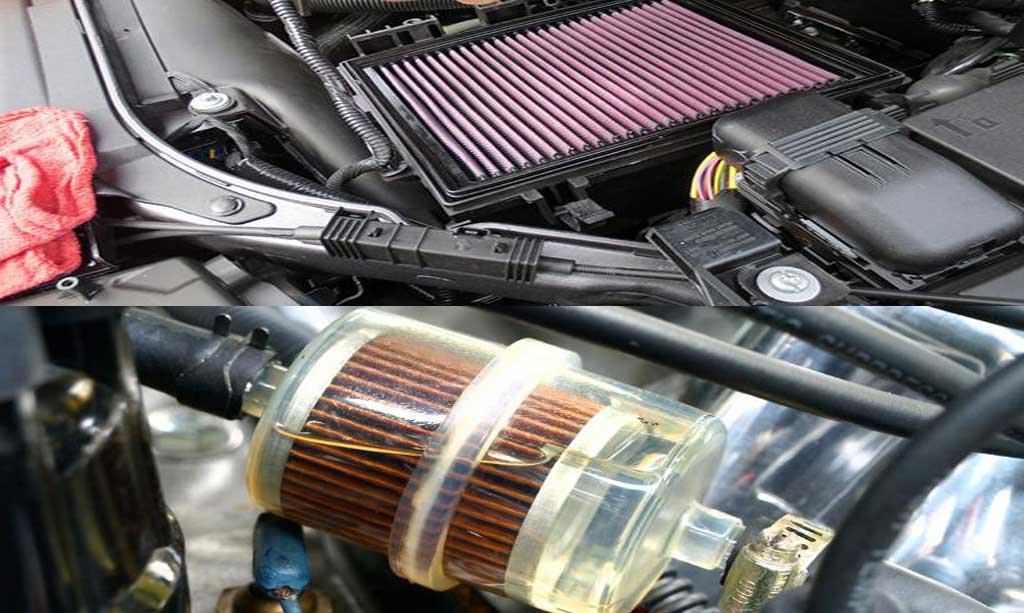
The Importance Of Changing Your Air Filter
An air filter might not seem like an important item to regularly check and change, but they are essential in maintaining your car’s performance. The air filter prevents small particles from entering the engine and causing potentially expensive damage to your engine. Here are the major benefits in keeping your air filter changed:
- Increased Fuel Efficiency:
How can an air filter make so much difference? A dirty or damaged air filter limits the amount of air flow into your car’s engine, making it work harder and, therefore, using more fuel. Since your engine needs more than 10,000 gallons of oxygen to burn every gallon of fuel, it’s important not to restrict air flow.
- Reduced Emissions:
Dirty or damaged air filters reduce the air flow to the engine, changing your car’s air-fuel balance. This imbalance can pollute spark plugs, causing the engine to miss or rough idle; increase engine depositions; and cause the ‘Service Engine’ light to turn on. More importantly, the imbalance also has a direct impact on your car’s exhaust emissions, contributing to the pollution of your surrounding environment.
- Prolongs Engine Life:
A particle as small as a grain of salt can get through a damaged air filter and do a lot of damage to internal engine parts, such as cylinders and pistons, which can be very expensive to repair. That’s why regularly replacing your air filter is so important. A clean air filter is designed to capture dirt and debris from the outside air, preventing them from reaching the combustion chamber and reducing the likelihood of you receiving a large repair bill.
Naturally, your air filters should be replaced in case of any damage. However, to maintain the highest possible performance of your car, it is recommended to replace your air filters at least every 12,000 to 15,000 miles. This interval should be reduced if you often drive in dusty conditions. It’s best to check the maintenance schedule provided by the manufacturer of your car for the appropriate replacement schedule. Give us a call here at Feldman Auto Center and we will gladly inspect your air filter for FREE and determine if it needs to be replaced.
The Importance Of Changing Your Fuel Filter
A clean fuel filter is essential to an optimally performing engine, and should be changed as a part of regular car maintenance. The fuel filter is located on your car’s fuel line, which pumps gas from the tank into the engine. It filters out contaminants to keep the fuel flowing smoothly. The fuel filter should be replaced every 25,000 to 30,000 miles or annually, but check your owner’s manual, as the recommendations may vary.
The fuel filter might be a part that doesn’t draw a whole lot of enthusiasm from car lovers, but its function is essential to the well-being of your vehicle. Without the filter, your fuel could end up tainted by all kinds of crud, including dirt and paint chips. Not only does the filter help to shield your fuel pump and injectors, it also plays a significant role in ensuring that you are achieving the highest fuel-efficiency possible. For many people, it is easy to forget about the importance of the fuel filter, which results in too long of a time passing before changing it out for a new one.
This is one of those basic maintenance things. While it’s easy to put off, it’s necessary, and absolutely worth it, to get it taken care of. If your fuel flow becomes reduced because foreign particles are not being filtered out, then you will risk reducing your engine’s performance, as it won’t be able to freely draw fuel, as it so desires. So, be sure you are mindful of signs that it’s time to replace the filter. Here are five of those signs
- Shaky Engine Idling
If you’re sitting at a stop light and the engine is feeling all jerky, then this could mean that you’re experiencing some kind of fuel flow inhibition, and there’s a fair chance that this could be because of a clogged filter
- No-Start
Sure, there are a myriad reasons why your engine might not be starting. But if your engine is unable to draw fuel, this could be one of the reasons. If you’ve already noticed symptoms of a fuel flow problem prior to the no-start, then this makes your fuel filter all the more suspicious when trying to find the culprit
- Difficult To Start
If you’re experiencing a partial blockage rather than full blockage, your car may well still start, but it won’t necessarily do so without a struggle. At this point you’ll want to make sure that you address the problem quickly so that you don’t end up finding yourself stranded once the filter is totally done for
- Engine Dies While On The Road
If it seemed like your car was having fuel flow issues, and then all of a sudden you found yourself stranded on the shoulder, this could indicate a possible fuel filter blockage.
- Engine Struggles At Low Speeds
If your engine seems to be receiving fuel just fine while on the highway, but then seems all shaky while pulling out of your driveway or hitting the gas after the light turns green, then this is another sign that it could be the filter.
If you are experiencing any of these symptoms, call us right away at Feldman Auto Center at 812-663-2886 and we’d be glad to inspect this for FREE for you and provide you with good solutions to replace these important filters.
